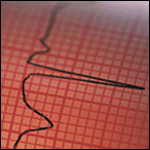CDC Features
Act Fast During Heart Attacks

How well do you score on recognizing the signs of a heart attack? And would you know what to do if you were having one? A new study by CDC's Division for Heart Disease and Stroke Prevention gives Americans a near failing grade. Just one in four adults surveyed in the study said they knew all five heart attack warning signs and knew also to call 9-1-1 if they were having one. Heart disease is the number one leading cause of death of both men and women in the U.S.
What are the Warning Signs of a Heart Attack?

• Pain or discomfort in the jaw, neck or back
• Feeling weak, lightheaded, or faint
• Chest pain or discomfort
• Pain or discomfort in the arms or shoulder
• Shortness of breath
Every year, over one million Americans suffer a heart attack. About 450,000 of those are fatal. About half of those deaths take place within one hour of the onset of warning signs and before the patient ever reaches a hospital.
What should a bystander do if they think someone is having a heart attack?
If you think that you or someone you know is having a heart attack, you should call 9-1-1 immediately.
Act in Time
The American Heart Association and the National Heart, Lung, and Blood Institute have launched a new "Act in Time" campaign to increase people's awareness of heart attack and the importance of calling 9-1-1 immediately at the onset of heart attack signs. You can find the links at http://www.nhlbi.nih.gov/actintime/index.htm.
Why is there a need to act fast?
Death or permanent disability (making it hard to perform daily activities of life) can result from a heart attack. The risk of death or permanent damage can be reduced with timely treatment. According to the American Heart Association, clot-busting drugs can stop some heart attacks in progress, limiting damage to the heart, reducing disability and saving lives. They work best if given within 1 hour of when heart attack signs begin. That's why it's important to recognize the warning signs of a heart attack and act right away.
The American Heart Association advises anyone experiencing any of the warning signs of a heart attack that 9-1-1 is almost always the fastest way to get lifesaving treatment. Emergency medical services staff can begin treatment when they arrive. Do not drive yourself to the hospital. Heart attack patients who arrive by ambulance usually receive faster treatment at the hospital.
What can you do to reduce your risk?
Persons can take steps to lower their risk of developing heart disease by preventing or treating and controlling high blood pressure, preventing or treating and controlling high blood cholesterol, by not using tobacco, by preventing or controlling diabetes, and by maintaining adequate physical activity, weight, and nutrition. Persons being treated for conditions or risk factors should follow the guidance of their health care providers.
CDC seeks to develop partnerships and create a research agenda that protect your health. The April issue of Preventing Chronic Disease focuses on heart disease and stroke. Articles in this issue include:
- Addressing Heart Disease and Stroke Prevention Through Comprehensive Population-Level Approaches
- Heart-Healthy and Stroke-Free, 2008
- Strategies for Controlling Blood Pressure Among Low-Income Populations in Georgia
- Emergency Medical Services Data for Cardiovascular Disease Surveillance, Program Planning, and Evaluation in Maine
For More Information
Page last updated: March 17,2009
Content source: Division for Heart Disease and Stroke Prevention, National Center for Chronic Disease Prevention and Health Promotion
Content owner: National Center for Health Marketing
URL for this page: www.cdc.gov/Features/HeartAttacks/
